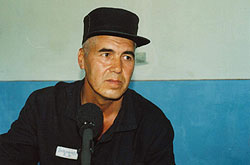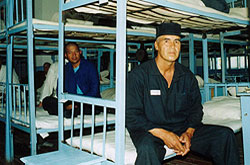Uzbek Editor’s Prison Sentence Extended
by Eoin Koepfinger / February 4, 2012 / 6 Comments
Continuing the Pattern of Repression
On January 24, just days before the scheduled release of Uzbek editor Muhammad Bekjanov, a district court in Kasan added an extra five years to his prison sentence for allegedly breaking unspecified prison rules. Bekjanov was the editor-in-chief of Erk, a now-defunct newspaper founded by Uzbekistan’s opposition party of the same name and is banned in the country. Muhammad Salih, Bekjanov’s brother and leader of the Erk party, now lives in exile in Norway after being sentenced to 15 years in prison in absentia. Three more brothers were also arrested in connection to the case.In 1999, a terrorist bombing in Tashkent, the country’s capital, sparked a brutal crackdown on political, religious, and press freedom. Bekjanov and his brother Yusuf Ruzimuradov were both extradited from Ukraine and sentenced to between 14 and 15 years in prison for, allegedly organizing the terrorist attack and for publishing and distributing Erk in exile, among other offenses. Human rights organizations have considered these to be “trumped up” charges.
It has been reported that Bekjanov and other Erk affiliates were tortured before and after their trials. While in prison at various facilities, Bekjanov has suffered repeated beatings. His injuries have included a broken leg (which received no medical attention), loss of hearing, and loss of most of his teeth, as well as tuberculosis from poor sanitary conditions. Bekjanov and Ruzimuaradov have been imprisoned longer than any other reporters worldwide, according to Committee to Protect Journalists (CPJ).
Bekjanov’s sentence was reduced in 2003 under a general amnesty that freed his brother Kamil, who had also been imprisoned on related charges. Another brother, Rashid was released in March 2011. Bekjanov was scheduled to be released this month, but in December prison officials mounted what has been called a “fabricated” case against him for violations of prison rules. Witnesses believe the inmates who testified against him were coerced. CPJ has called for his immediate release and, the prosecution of those who tortured him in prison. Erk leader Muhammad Salih has vowed to continue his opposition to President Islam Karimov’s government, despite the pressure put on his family. Bekjanov expressed similar defiance in an interview published in 2005.
In its 2012 World Report Human Rights Watch called Uzbekistan’s human rights record “appalling.” Karimov’s government is known for its consistent persecution and torture of political dissidents, writers who criticize the government, and religious observers who worship outside of government proscriptions. In 2005, government forces allegedly massacred between 500 and 1,500 protesters in Andijan. The government has refused any independent investigation into the killings and continues to persecute witnesses of the massacre and anyone believed to have been involved in the protests, which are reported to have started because of poor economic conditions in the region and popular resentment of Karimov.
In recent news, Uzbekistan’s ministry of education recently outlined a new code of conduct for University students and professors that some have compared to prison regulations. The code bans certain types of dress and rock concerts, compels students to “facilitate the blocking of foreign religious and extremist movements,” and, perhaps most troublingly, forbids students to discuss campus matters on the internet.
The Karimov government’s intolerance toward criticism was also publicized last year when Lola Karimova, the president’s youngest daughter, brought a defamation suit against French newspaper Rue89 for describing her as a “dictator’s daughter.” The paper also accused her of trying to “whitewash Uzbekistan’s image” through her participation in charity events. Karimova sought $43,000 in damages for the article, which was published in May 2010. A Paris court rejected the case in July of last year.







6 Comments on "Uzbek Editor’s Prison Sentence Extended"
Trackbacks for this post